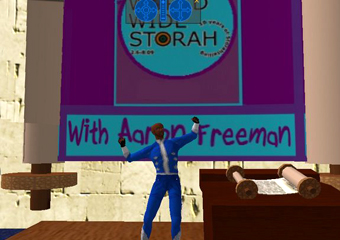
A weekly torah takeaway by Amichai Lau-Lavie
A year-long Jerusalem Journey, action by action, verb by verb. Each week I pluck a verb from the Torah portion and set it reverberating both with its context and with my own. Let's make this a conversation, and talk our walk.
February 25, 2009
Newark International airport was celebrating Black History Month this past Sunday. A stage was set up in one of the food courts and a beautiful African American dancer was performing solo, with a playback of a Gospel choir praising the Lord in full volume, Amen Hallelujah.
People stopped to watch. I was sitting at gate C108, waiting to board a flight to Tel Aviv, sipping tea and loving the music. Nearby, a group of Hasidic men stood facing a wall, praying Mincha, the afternoon prayer. A Jewish orthodox girl, slender, long skirt, long sleeves, about 15, stood up a few seats away from me, clutching a prayerbook and praying – davening is the Yiddish word-- fervently, facing the same direction as the men. I watched her closely, lips moving, furrowed brow, body swaying, but tense. She was very focused, ignoring the crying babies nearby, the folded stroller that she was practically standing on, and the gospel music overhead. And then she was done, stood straight, closed the book, kissed it, sat down. Clapping was heard – the dancer was bowing to the audience and the choir, with ‘Jesus take me hooooooooooooooooooome’ took it home and ended. Amen.
There in that public square, a bland airport terminal, the sacred was experienced in multiple ways-- simultaneous, overlapping, mutually respectful, or at least tolerant of each other. The dancer had her eyes closed, as did the young Jewish girl, and both stood out in time and space by their very public (but also very private) acts of devotion. They performed their duties: they sanctified the moment.
And I watched, inspired by these gestures of faith, and wondered: Religion meeting art meeting commerce in the global marketplace –– meet and compete? It made me think: the place of religion in the public square-- perhaps one of the key challenges of the 21st century. Can there be a respectful co-existence of ‘private’ expressions of the sacred, in relation to each other – and in relation to the shared ‘secular’ arena?
This is a personal challenge: how do I honor the sacred in my every day busy life? How do I – do we --sanctify our here and now, while so often – physically and metaphysically – on the move, on our way to or from ‘home’?
This challenge of building a home–of sanctifying space and time in the ever shifting public square--is also on Moses’ mind this week, as Exodus rolls on and the new game in town is called ‘build a tabernacle’.
"Make me a sanctuary so I will dwell among them" (Ex.25:8). God’s new instruction to Moses and his people demands an elaborate, costly production. For many chapters ahead of us, starting with this week’s tale ‘Terumah’ – ‘the Donation’ – we will follow Moses and his construction crew on a detail by detail description of the building of the first sacred place in Jewish history, gold tassels and all. In due time, this moving tabernacle will, well, move – and eventually graduate to a Jerusalem mountaintop marble temple which will topple, twice, until all we have left today are local substitutions, including a random airport wall, facing east.
We've got plenty of upcoming Torah portions discussing the Tabernacle in which to deal with the timeless philosophical issue of ”who needs a house for God if God is everywhere.” For now, I just want to reflect on the basic human urge to ‘sanctify’ reality – to access the transcendental through tangible action that defines our values, beliefs and sense of self.
Sanctifying is an art. Done alone or with others, the act of sanctifying is this delicate art of making meaning of a moment, and really meaning it.
It’s hard to teach ‘sanctification’ but somehow – we all know how to do it.
Imagine putting just the right number of candles on a birthday cake and turning off the lights, and then getting whoever's there - even in a restaurant full of strangers - to sing ‘happy birthday!’ Even if this is not an ‘officially religious’ act – is this not sanctification of time and place? Or, choosing that one perfect song from the soundtrack of your life, there on your IPOD, in the middle of the subway on a hard day, sitting there with headphones on crying and rewinding and playing again – that’s you in the corner, gaining your religion… Not another strange modern example of sanctifying the moment, of building a sanctuary in the midst of life?
Sanctifying isn’t really about the place – tabernacle or temple or church, not necessarily – it’s mostly about the experience, the gesture, the yearning. The 13th century Book of Zohar puts it beautifully, quoting the same verse from Exodus: "Build me a sanctuary that I may dwell among them"-- The Divine dwells among ‘them’--the people who come together to sanctify life – and does not dwell inside ‘it’ – the sanctuary. It’s not about the building as object – it’s about the act of building. Maybe all temples and sacred places are just there to remind us that the human soul is the seat of the sacred – residing within each and every one of ‘them’ – us – and not only, if ever, within the tabernacles of the world.
Anyway. I got on that plane, feeling more centered and focused, grateful to the dancer, and the davening girl for their inspiration, and hummed holy gospels all the way home.










